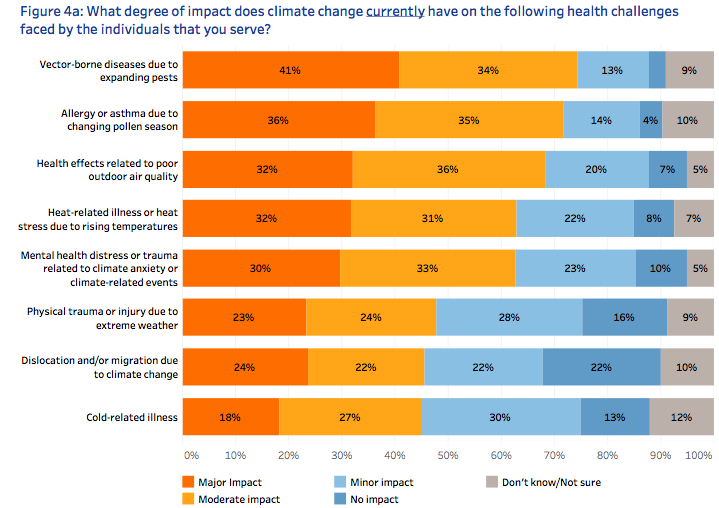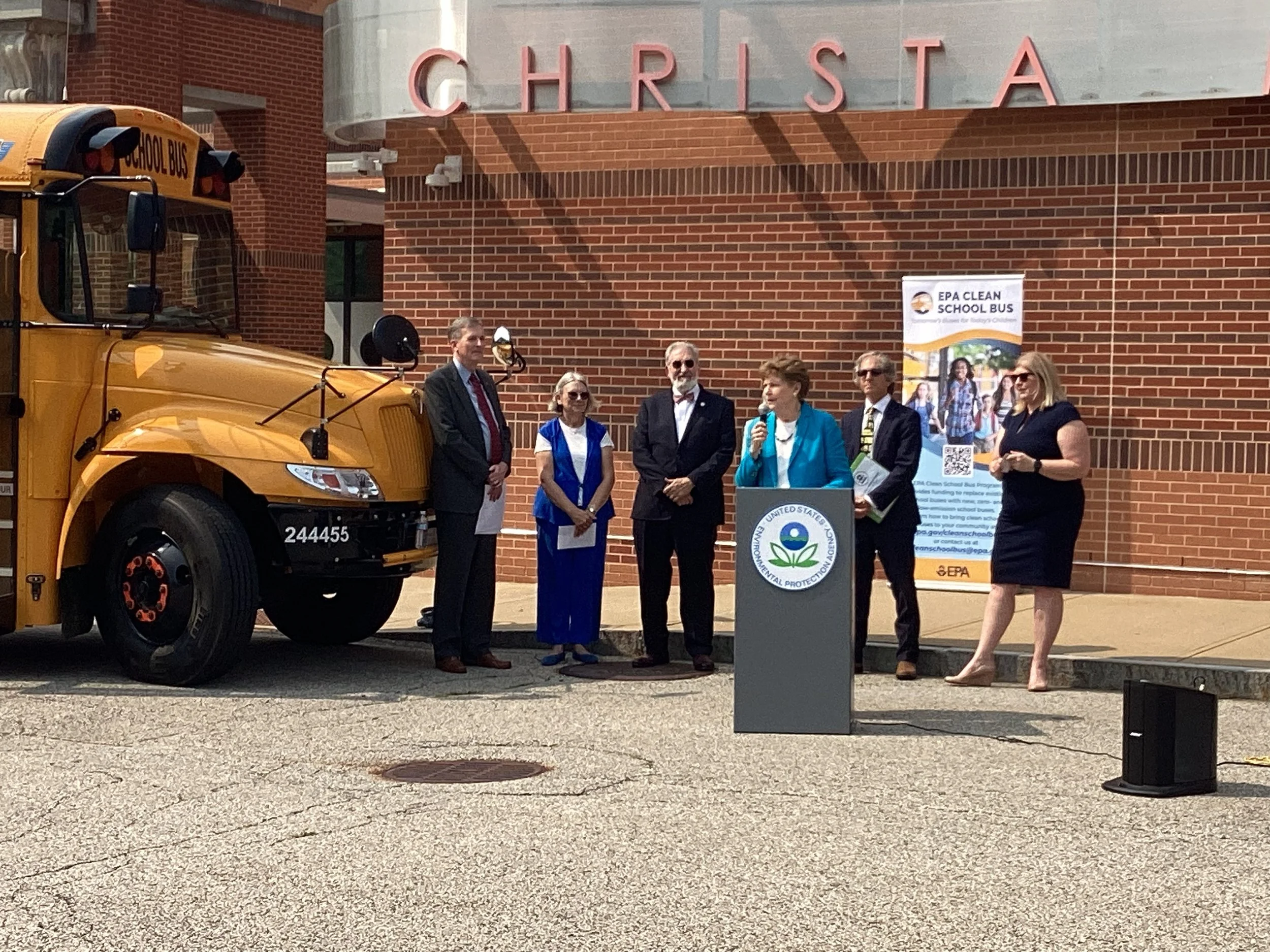NH Climate Health Action Talk
August, 2024
Scroll to Read:
2024 NH Healthcare Worker Survey Report
Clean School Bus Event with Senator Shaheen and EPA Regional Administrator Cash
“Supreme Court’s Chevron ruling means people of NH must work harder for the environment”
Upcoming Webinar
Bimonthly Challenge: Re-Cycling
Thank you to our Corporate Sponsors!
2024 NH Healthcare Worker Survey Report
NH Healthy Climate and the UNH Survey Center collaborated on a 2024 survey of healthcare workers across NH, collecting data on their knowledge and experiences on climate and health.
NH Healthy Climate’s Dr. Pat Edwards spoke at a Clean School Bus Event with Senator Shaheen and EPA Regional Administrator Cash
On Wednesday, August 14th at the Christa McAuliffe School in Concord, Senator Shaheen and EPA Regional Administrator Cash hosted a Back to School Clean School Bus event celebrating all of the funding New Hampshire has received thus far to transition school buses to electric. Dr. Pat Edwards, a Concord pediatrician and member of NH Healthy Climate’s Children’s Health Working Group, spoke about the children’s health benefits of e-buses including cleaner air, less noise pollution, decreased greenhouse gasses and improved efficiency for our buses.
“Supreme Court’s Chevron ruling means people of NH must work harder for the environment” by NH Healthy Climate volunteer Mike Cohen, posted in NH Bulletin
The US Supreme Court has been in the news lately. It is the end of the session and many court observers know that a number of important and controversial rulings are out. Especially those related to environmental quality, climate and health of our communities because the rulings will have a serious impact on the progress toward addressing climate change and health. In particular, on Friday, June 29,2024, by a vote of 6-3, the justices overruled their landmark 1984 decision in Chevron v. Natural Resources Defense Council, which gave rise to the doctrine known as the Chevron doctrine. This ruling is another that, this court has issued which breaks with long-standing court precedent and which has the potential of upsetting significant federal agency and department legal interpretations, policy development, regulatory and rules dealing with a multitude of issues including, but not limited to:
Health safety, food safety research and production, tobacco regulations,
Health insurance coverage, access to health delivery systems services, payment and pricing
Environmental law addressing clean air, water, energy and emission standards, tax credits and rebates to motivate clean energy production or electric vehicles and protection of significant natural and wildlife resources.
Basically, this ruling shifts the policy-making processes and authority out of the hands of government and agency experts, scientists, and informed decision-makers who use science to support their policies, and puts the decisions into the hands of the courts, appointed and/or elected judges, who will not be required to turn to seek expert advice to support their rulings.
The results are likely to be slower and more politically fraught processes to develop policy and rules supporting and clarifying statutes, and of course, likely more lawsuits challenging agencies, departments, and other governmental authorities that make changes and decisions in policy and regulation as new scientific evidence becomes available.
After the decision, legal experts are suggesting that this decision will negatively impact, at minimum, agriculture, protections for clean air regulations, and protections for clean water and watersheds – another blow to science.
Environmental and health advocates often rely on the latest scientific evidence when testifying about potential new laws or changes in regulations, along with personal anecdotal stories that dovetail with the science, demonstrating the benefits and/or risks associated with these potential new laws or regulations.
Now the courts, and I’m sure legislatures, too, may well treat the information presented during hearings by a business interest, industry representatives, or biased individuals just as reliable and valid as the evidence presented by reputable scientists, specialists, or experts trained in the subject matter at hand.
With the overturning of the Chevron doctrine, the climate will likely continue to get warmer at a faster pace, and the impact on community flooding and seashore erosion from more intensive storms may well happen at a quicker pace, too. More intensive heat and airborne disease are also likely to increase, impacting our individual and community health and safety.
If the Chevron decision has significant implications for federal environmental and health laws, it means that now, more than ever, organizations like the N.H. Association of Conservation Commissions and NH Healthy Climate (I am a member of both but am not speaking for either in this piece) must work harder and smarter: conserving critical natural resources, fighting for clean air and water, promoting awareness and education about a changing climate’s impact on people and the environment, and assuring clean, open space for New Hampshire residents to enjoy and be healthy.
The Supreme Court has taken action; it is up to us to do the same.
Fretting about a poor decision won’t get the healthy natural environment or the health we need and deserve. We have to work for it. Join with others and fight to make New Hampshire a healthy place to live, work, and play.
Upcoming Webinar
“Fungi - emerging pathogens in a changing environment”
Tuesday, September 17th from 6:00 - 7:00 PM ET
Robert A. Cramer Jr., PhD is a Professor of Fungal Pathogenesis Dartmouth’s Geisel School of Medicine’s Cramer Laboratory.
Bimonthly Challenge: Re-Cycling
Watching the Olympics has motivated me to start riding my bike again. I like to think of this as Re-Cycling. Did everyone see Kristen Faulkner win the women’s road race in Paris? Wow! After watching the women’s road race today I dusted off my celeste blue Bianchi road bike. I then smartly decided to opt for my easier-to-ride, rusty hybrid with the wide seat and took it for a ride. Once I worked out which bike I would use, I also decided to check out some “HealthyClimate” facts and write my next challenge. Check out the People for Bikes website here.
Here are some facts to get us motivated for biking:
One NASA analysis found that motor vehicles are the single greatest contributor to atmospheric warming. (NASA, 2010 Road Transportation Emerging as Key Driver of Warming)
A great study from Atlanta Georgia during the 1996 Olympics showed that acute care visits for asthma decreased by 41% correlating with blocking off traffic, which resulted in decreasing Ozone concentrations of 23%. (Other acute care visits like ear infections, stomach bugs, broken bones etc. stayed the same) (Friedman, M. et. Al., 2001 JAMA 285(7):897)
A San Francisco Bay area study estimated that increasing biking or walking for just 4 to 24 minutes a day could reduce cardiovascular and diabetes development by 14%. (Maizlish, N et al 2012)
One estimate showed that if the people in the US were to increase the percentage of biking or walking for transportation instead of cars it could lead to a fuel saving of 3.8 billion gallons a year and reduce greenhouse emissions by 33 million tons per year. (Rails to Trails Conservancy, 2008 “Active Transportation for America'')
A study done in Wisconsin estimated that if 20% of short car trips were replaced by bicycle trips in the large cities of Milwaukee and Madison, it would prevent 57,405 tons of CO2 emissions per year.
Now, here is our NH CHAT Challenge:
Using the Wisconsin data above: try biking or walking for 20% of your shorter car trips.
If you need to start with a slightly less ambitious challenge use the San Francisco study and add as little as 4 to 24 minutes of biking a day to your routine to increase your physical health and consider using the bike for some of your short car trips.
No matter what kind of bike you have: Enjoy!
Dr. Darla Thyng
Keep an eye out for our 2024 Annual Fundraiser, launching in September this year!
Thank you to our corporate sponsors!
The Nature Conservancy in New Hampshire
The Nature Conservancy in New Hampshire is honored to sponsor NH Healthy Climate this year. TNC works to protect the lands and waters on which all life depends, and envisions a world in which people and nature thrive together.
It is no secret that the great outdoors can have outstanding benefits on a person’s physical health. Less understood, however, is the tremendous comfort that time spent in nature can have on a person’s mental well-being, and how our changing climate impacts that relationship. Research from Procedia, a journal of social and behavioral sciences, shows that increased air pollution from climate change exacerbates respiratory diseases, negatively impacting people’s daily functioning and health. The same study also demonstrated that climate change-induced food and water scarcity can lead to higher levels of stress and anxiety, diminishing people’s quality of life. Furthermore, a study from the Proceedings of the National Academy of Sciences focusing on 900,000 residents in Denmark found that individuals with greater exposure to green space were less susceptible to psychiatric disorders such as depression, eating disorders, substance use disorders, schizophrenia, and mood disorders. Additionally, the group with the least green space exposure was 55% more likely to develop a mental illness. Of course, it is important to note that not everyone has access to abundant green spaces.
A local mother and her young daughter check the trail map at Manchester Cedar Swamp Preserve. © Rooted in Light Media
Luckily, The Nature Conservancy is working on improving everyone’s access to the natural world. In Manchester, the All Persons Trail at Manchester Cedar Swamp Preserve encourages individuals of every background to explore the beauty that New Hampshire has to offer. Located in the state’s most populated city, this universally accessible trail is suitable for all abilities, including individuals using wheelchairs, and curves through 1.2 miles of globally rare Atlantic white cedar habitat, mystical wetlands, bright flowers, and unique rock formations. A free audio tour, available in both English and Spanish, provides an even more immersive experience.
Dr. John Butterly, former President of the New Hampshire Medical Society, and current trustee for The Nature Conservancy in New Hampshire, agrees that mental health is much improved with exposure to nature. “The Nature Conservancy has an incredible amount of acreage that is protected and preserved, but not necessarily accessible,” he acknowledged. “TNC in New Hampshire is making a big effort to increase accessibility where it makes sense.”
In the past several years alone, we have made great strides towards accessibility to nature with the creation of All Persons Trails in Manchester and Ossipee. It is crucial, however, that we continue to support efforts to increase access to and conserve natural spaces.
Reconnecting individuals to the outdoors takes place throughout the state, including the 30 preserves that TNC protects and conserves. Visitors can traverse these varied landscapes throughout the Granite State, and in doing so, support their physical health and mental well-being.
As Dr. Butterly says, “It [nature] is absolutely therapeutic, and if we don’t conserve that, it will affect our children and our grandchildren.” We couldn’t agree more! Explore The Nature Conservancy’s preserves across the Granite State at nature.org/newhampshire.








